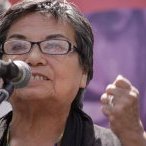English · Español

16 de abril de 2018 | Entrevistas | Agua | Acaparamiento de tierras | Agroecología | Anti-neoliberalismo | Género | Industrias extractivas | Soberanía Alimentaria
“We fight and organize ourselves to feed the world”
Interview with Francisca “Pancha” Rodríguez, a leader of the rural and indigenous women´s movement of Chile, in the International Day of Peasant Struggle
Descargar: MP3 (2.6 MB)
“We are paying homage to those who fell yesterday and those who are resisting today”, said the member of the Latin American Coordination of Countryside Organizations (CLOC) – Via Campesina, in an interview with Real World Radio. Recovering the class and peasant identity, resisting FTAs, giving a space to new generations in the movement, are some of her current claims.
Amid the preparations for the “mistica” to take place on April 17 during the Chilean farmer peasant women´s assembly, Francisca said that “it will be a day for political reflection and insurgency” in a context where peasant and indigenous organizations need to “recover their class identity awareness” against competition and the lack of solidarity promoted by entrepreneurship in the framework of the capitalist system.
The historical leader and member of the National Rural and Indigenous Women Association of Chile (ANAMURI) and the Latin American Coordination of Countryside Organizations (CLOC) – Via Campesina, made reference to the situation in Brazil and the example of struggle of the Landless Rural Workers Movement (MST) and CLOC-VC in that country.
In the interview with Real World Radio, she said that we need to be alert due to the attacks experienced today by social movements in Brazil and said that although “Lula is the figure; the spirit and reason of the people is to defend the class identity that joins the resistance, such as the MST, which, since its origins, has shown us the way: to give content to the struggles, as well as CLOC-Via Campesina in Brazil. It is not a matter of recovering lands for the recovery itself: this struggle is part of a larger struggle which is to defend one of our fundamental rights: food”.
In addition, she urged not to forget the struggles being fought by social, peasant and indigenous movements also in the peace process in Colombia and the current attacks against Nicolás Maduro´s administration in Venezuela. Rodríguez expressed her rejection to free trade agreements in Chile, such as the one this country expects to sign with Uruguay. About this, she made reference to the need to resist, especially, the “sinister” incorporation of a chapter focused on Women and Trade.
Pancha also made reference to the situation in her country, after the reelection of Sebastian Piñera in 2017: “This right-wing government aims to end with peasant agriculture. Farming programs focused on peasant and indigenous family farmers involve technology packages that kill agriculture, destroy our seeds, and worst, destroy our awareness, which has serious costs for our food sovereignty”.
In Chile there are approximately 260.000 farmers according to official figures, which Pancha described as “clients of governmental programs (they were once “beneficiaries”, then “users”), who obtain credits and subsidies based on production systems and crops that want to be introduced and strengthened according to the demand of a market that is not the popular market”.
This is why she considers that the International Day of Peasant Struggle is “a reaffirmation of how we resist and struggle against agricultural policies, the invasion of our territories, what happens with natural resources such as land and water, and our sovereignty in response to the extreme loss of identity suffered by our communities”.
“We can´t only pay homage to our comrades who lost their lives. Our proposal is wholesome production, leaving aside the use of agrotoxics, encouraging a non-institutionalized agroecology, that does not only produce for one segment of the population, for the elite which has the pleasure to enjoy what we produce. The rich are eating the food the poor ate yesterday, so: what are the poor eating now? A large part of the production of our people goes to the market, it doesn’t stay here in our homes and we end up eating what the big companies want, which is food that makes us sick”, stated Rodríguez.
ANAMURI and CLOC-VC have a feminist, peasant and popular proposal: “If we, as women, don´t fight this battle, our comrades end up succumbing to patriarchal and neoliberal policies. So our work is duplicated. The difference is that today we are aware of the importance of defending our own life and our own existence as peasants”.
Imagen: ATALC








